In his forward to the 25th edition of The Famished Road Ben Okri states that he wrote the book after a decade of experimenting with many kinds of magic operations that the visible and invisible words can perform.
This is a good starting point from which to consider Okri’s story and his style. The novel tells the story of a poor Nigerian family which is often compelling to read. At the same time the narrative can become obscure when it slips into dream sequences or delves into the spirit world. In the same way that we understand Okri’s decade-long struggle to perfect his art, we may also find his language frustratingly obscure. In the context of the novel we might assume Okri meant ‘visible and invisible worlds’ in his introduction, referring both to the quotidian reality of the narrator’s poverty, and the atavistic pull the spirit world exerts upon him. But Okri meant what he wrote: I was fascinated by the effect that a word in the diagonal vision might have on the reading, or that the absence of a word might have on the mind’s conjuration.
This may confirm Okri’s intention but it doesn’t help our understanding much. Already I am putting aside any thought of attempting to explain diagonal vision
since that would be like chasing a rabbit down a hole, a kind of diversion into Derridean différance: the deferral of meaning, the slippage of the signifier…
And that’s all fine for the post-structural play of postgraduate convolutions, but it can lead to vagueness in the text and the alienation of the reader, depending upon your mindset of course, when found in a novel. Which of the thousands of words absent from any part of the text are meant to act upon the mind’s conjuration
? Surely it is the role of the author to select which words will be read? Many people love this book, which accounts for its success. And I must say, for a large part, I enjoyed it. But it was also overlong and I found that some of the dream sequences or intrusions from the spirit world didn’t quite work for me, and that’s what I wish to primarily address.
Let’s start with what the book is about. Azaro is born with a smile on his face, determined to try to live in our world. He is born into an African nation, un-named, but assumed to be Nigeria, Okri’s home country. Azaro remembers the spirit world which he sees as his true state of being: a world of perfection, lacking suffering. The novel opens with a description of the spirit world, its king and its culture, and the movement between the spirit world into our understanding of life and then back again. Azaro explains that he is an abiku, a spirit-child who never loses his awareness of the spirit world when he enters life, and therefore is always tempted back to death, the threshold between our world and the other. In fact, he has made a pact with other abiku that they would always return to the spirit world after birth at the first opportunity. For this reason, spirit children are a source of pain for their mothers who lose their children repeatedly. This time, however, Azaro has decided to break his pact and remain in the land of the living, to experience it and learn about it. This is the source of some tension in the novel. Azaro’s spirit companions make several forays into the real world to draw him back across the threshold into the spirit world.
How this aspect of the novel is received largely depends upon the predilections of the reader. I personally found it less compelling for several reasons. First, the idea of a spirit world is alien not only to my way of thinking, but to my experience – to the experience of any person, I would think – in the literal sense it is presented in the novel. Spirits not only cross the threshold in the novel, but they take on corporeal forms that those who are not abiku can see. Azaro’s father, who takes up boxing in the latter half of the book, fights a spirit in an epic boxing match. The wounds he sustains in the encounter are very real and not spiritual. Spirits in Okri’s world interact not only with those who see them, but take an interest in affecting the progress and political wellbeing of Azaro’s village. They can threaten, possess, interact and form alliances with each other to effect outcomes in our world.
I’m willing to concede that my objections so far are due to a dull-witted literal-mindedness. Possessions and spells embody a part of the culture the novel represents. But I found the representation to be vague and inexact, thereby making the engagement with the conceit that much more difficult. The opening sentences of the novel tell us: In the beginning there was a river. The river became a road and the road branched out into the whole world.
There are two things happening here. First, is the language, parodying the opening of Genesis. Okri states in his introduction that he devoured the world, through art, politics, literature, films and music
. And having devoured
(always the language of consumption in this book) this eclectic mix, I made up stories in the matrix of the ancestral mode
.
That sounds a little esoteric but I think I know what he means. He took stories from literature and other cultures and adapted them to his own. So, we get the point that Okri’s spiritual representation is imbued with more familiar Western types. It shouldn’t surprise us, then, when we sense echoes of the Christian myth in his opening, or allusions to Greek and other myths throughout. Early in the novel Azaro is drawn towards the spirit voices too sweet for me to bear
recalling the siren song in The Odyssey. A spirit who leads Azaro into the underworld, as he lies delirious and weak from hunger in reality, recalls Virgil leading Dante into the Underworld. There is even a ferryman there, recalling Charon. The spirit’s exhortation to Azaro not to eat in this world otherwise he will, be stuck in the dreaded interspaces
recalls Persephone’s fate when she eats the pomegranate seeds in Hades’s Underworld. Okri peppers his story with this kind of thing. Madame Koto, the owner of the local hotel, is often associated with a black cat and witch craft, for instance.
The second thing that can drawn from the opening is a sense of confusion that is never truly resolved. I mean Okri’s symbolism. How did a river become a road? Why not start with the road since this is the dominant imagery throughout the book? Azaro’s spiritual guide tells him that the road is a link between the spirit world and our world. This road has no end
he tells Azaro, but a few pages later that road is only two feet long and represents a two-thousand-year project of the spirits to connect their world with our own. From a certain point of view the universe seems to be composed of paradoxes,
Azaro is told, But everything resolves.
Still, the paradoxes seem unsatisfying rather than edifying. The road represents their soul, the spirit tells Azaro, since its building requires effort and suffering. The spirit tells Azaro that the spirits:
. . . wanted to live, to be more alive. They wanted to know the essence of pain, they wanted to suffer, to feel, to love, to hate, to be greater than hate, and to be imperfect in order to always have something to strive towards, which is beauty. They wanted also to know wonder and to live miracles. Death is too perfect.
It seems to be another paradox; that heaven, being too perfect, is imperfect. Ironically, the spirits subject themselves to a Sisyphean feat (another Greek allusion) to build the road – to shape their soul and to feel – only to have it destroyed by all manner of natural disasters, with each generation of spirits having to start the work anew.
I wasn’t sure why eternal spirits have generations, but there you go.
The road also has a stomach. I didn’t quite get this.
Famishment, as indicated by the title, is linked to the spiritual. The denial of the body is often associated with the spiritual in aesthetic traditions. Azaro almost dies in an attempt to starve himself to spite his father, which is how his journey with this spirit is undertaken. His mother tells him that the only power poor people have is their hunger. She tells him a fable of a religious man without a stomach. When the man meets a disembodied stomach he refuses to join with it: When I didn’t have you I travelled far, was never hungry, was always happy and contented, and I was strong.
This eschewing of the physical represents a spiritual aspect of the novel, but it is also forms a nexus with the novel’s political story which I found more interesting and successfully accomplished. Azaro’s village is in a state of change. Madame Koto embraces change – she is the first to have electricity and own a car – and she supports the Party of the Rich. Azaro’s father and mother support the Party of the Poor. The story of Azaro’s parents’ struggle to survive, their conflicts within the village and the attempted exploitation of the village people by the political parties forms a story far more relevant and appealing. Okri’s spiritual world represents traditional beliefs and culture, while the world of Madame Koto and her political affiliates represents the challenges to tradition. A road built in the forest may be ruined by storm but the march of progress is inexorable. The road connects not just the physical and spiritual but also traditional culture to modernity. The journey taken by Azaro’s father from labourer to boxer and then to politician is indicative of the changes in the society. I found this story most compelling, through incidents like the poisoning of the poor people of the village by the Party of the Rich, or Madame Koto’s trend towards western decadence in her bar.
The pity of this book is that Okri marries these disparate aspects of his plot too late. There are wonderfully surreal passages and allusions to spiritual belief throughout the novel, but it ultimately has to mean something beyond the fantasy of Azaro’s struggle against the forces of the spirit world (a story which has more in common with fantasy than magic realism or post-colonial fiction). Okri finally makes this connection through spiritual visions of the future and past – now the road links us both to the past and the future – in which white men exploit the natural resources of the land and enslave Africans on slave ships: in which the first white explorers in their sailing ships drop anchor portentously on the African shore. Suddenly, the land itself is an abiku child, caught in a cycles of war and famine
and justice and beauty
. And there is the threat to the land - people poisoning the sky and waters
- which is also linked to this idea of the abiku land, a nod, surely, to environmentalism. All this is justifiable in one way or another based upon the text, but it comes suddenly. It feels like a clumsy explanation; a desperate plea for relevance as a post-colonial text, when the necessary components have been there all along. The rats which eat away at Azaro’s house throughout the novel – a wonderful image juxtaposed with the family’s own hunger – and literally chewing away at their lives, are a wonderful metaphor for the voracious exploitation by the ruling class. But whether that ruling class – represented by the Party of the Rich – is financed and driven by white interests, is something never addressed explicitly, thereby diminishing the impact of the story until its closing chapters.
That was part of the problem for me with this book. Okri doesn’t tie his extended metaphors down a lot of the time, allows his narrative to morph in its meaning and is content to explain much away with paradox. There are those who would dismiss this view, but I know I wanted the novel to be stronger than it is. It was most compelling in its stories of poverty, of the rise of politics in the local community and Azaro’s family’s struggle to overcome poverty. There are even bar room fights and a rags-to-riches story worthy of Rocky to keep the reader entertained. All this covered a good part of the novel and despite the criticisms I have made in this review, I actually enjoyed reading the novel for the most part. However, I was less engaged with the advent of another intrusion by the spirit world into our own: another attempt to lure Azaro; another fight with spirits; another strange occurrence that sees Azaro in another world. It became too repetitious, meaning the spiritual aspects of story didn’t effectively advance the plot. This was a novel about real issues facing Africans. Nigeria gained its independence from Britain in 1960, which is alluded to only once or twice in the story, but Okri makes little of this. And while the novel had to reflect an African culture – to characterise an African sensibility – I felt Okri became too immersed in his own fantasy for it to have the impact he seemed he wished it to have by the closing chapters of his story.
This is an enjoyable read for the most part, but the repetition of some of the spirit world sequences might try the patience of some readers, depending on their own interests and point of view. But much of it is a compelling story, nevertheless. The Famished Road is the first novel in a sequence of three novels featuring Azaro. The sequel is Songs of Enchantment while the trilogy finishes with Infinite Riches. Those who enjoy all aspects of The Famished Road may wish to check them out as well, but for me, I’m happy to have just read this novel.

 RSS Feed
RSS Feed Facebook
Facebook Instagram
Instagram YouTube
YouTube Subscribe to our Newsletter
Subscribe to our Newsletter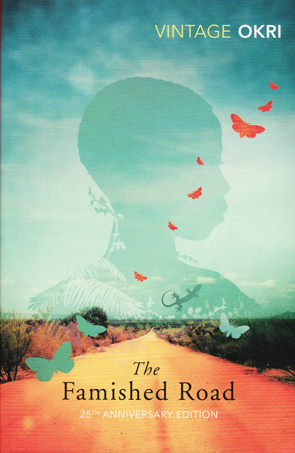
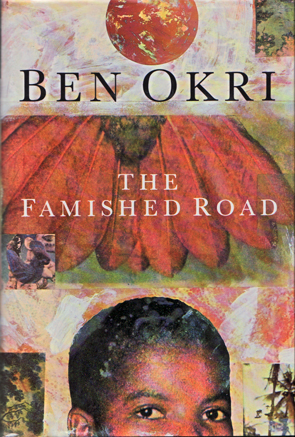

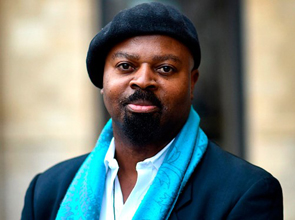
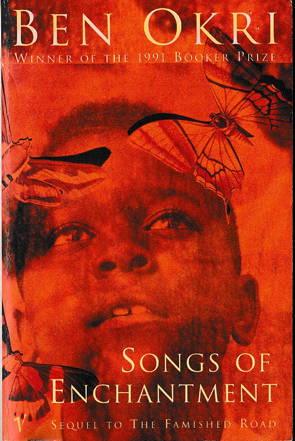
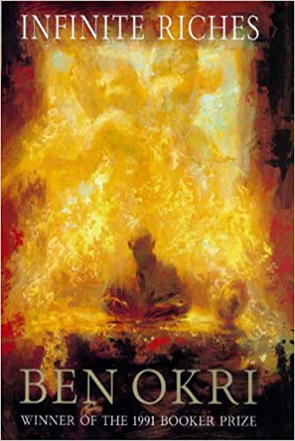


No one has commented yet. Be the first!